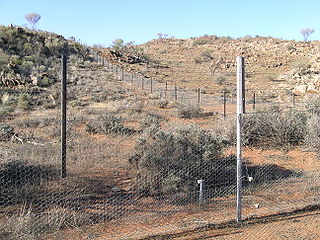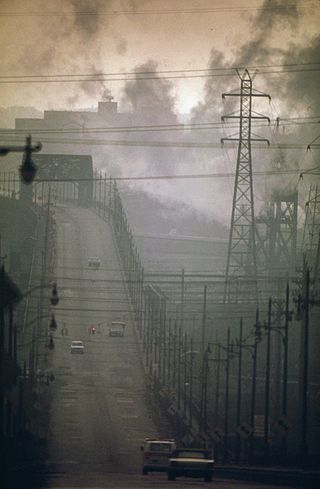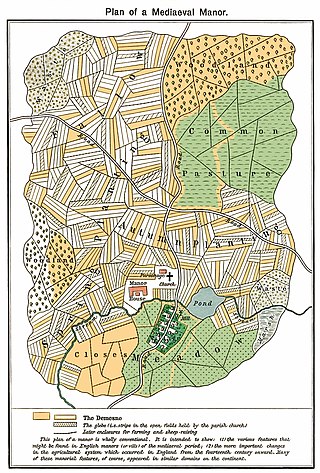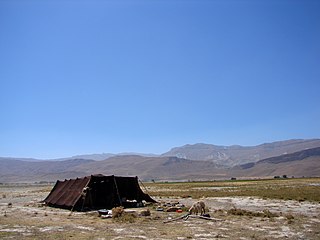
Overgrazing occurs when plants are exposed to intensive grazing for extended periods of time, or without sufficient recovery periods. It can be caused by either livestock in poorly managed agricultural applications, game reserves, or nature reserves. It can also be caused by immobile, travel restricted populations of native or non-native wild animals.

The tragedy of the commons is a metaphoric label for a concept that is widely discussed in economics, ecology and other sciences. According to the concept, should a number of people enjoy unfettered access to a finite, valuable resource such as a pasture, they will tend to over-use it, and may end up destroying its value altogether. Even if some users exercised voluntary restraint, the other users would merely supplant them, the predictable result being a tragedy for all.
In environmental philosophy, environmental ethics is an established field of practical philosophy "which reconstructs the essential types of argumentation that can be made for protecting natural entities and the sustainable use of natural resources." The main competing paradigms are anthropocentrism, physiocentrism, and theocentrism. Environmental ethics exerts influence on a large range of disciplines including environmental law, environmental sociology, ecotheology, ecological economics, ecology and environmental geography.

The open-field system was the prevalent agricultural system in much of Europe during the Middle Ages and lasted into the 20th century in Russia, Iran, and Turkey. Each manor or village had two or three large fields, usually several hundred acres each, which were divided into many narrow strips of land. The strips or selions were cultivated by peasants, often called tenants or serfs. The holdings of a manor also included woodland and pasture areas for common usage and fields belonging to the lord of the manor and the religious authorities, usually Roman Catholics in medieval Western Europe. The farmers customarily lived in separate houses in a nucleated village with a much larger manor house and church nearby. The open-field system necessitated co-operation among the residents of the manor.
A land ethic is a philosophy or theoretical framework about how, ethically, humans should regard the land. The term was coined by Aldo Leopold (1887–1948) in his A Sand County Almanac (1949), a classic text of the environmental movement. There he argues that there is a critical need for a "new ethic", an "ethic dealing with human's relation to land and to the animals and plants which grow upon it".

Pastoralism is a form of animal husbandry where domesticated animals are released onto large vegetated outdoor lands (pastures) for grazing, historically by nomadic people who moved around with their herds. The animal species involved include cattle, camels, goats, yaks, llamas, reindeer, horses, and sheep.
John A. Baden is founder and chairman of the Foundation for Research on Economics and the Environment (FREE) based in Bozeman, Montana. In addition to FREE. he cofounded the Property and Environment Research Center (PERC), the Environmental Management MBA program at the University of Washington, and Warriors and Quiet Waters. He has taught at Indiana University, Montana State University, Utah State University, and the University of Washington. Baden and his wife, Ramona Marotz-Badem, own a ranch in Gallatin Gateway, outside Bozeman, Montana.

Garrett James Hardin was an American ecologist and microbiologist. He focused his career on the issue of human overpopulation, and is best known for his exposition of the tragedy of the commons in a 1968 paper of the same title in Science, which called attention to "the damage that innocent actions by individuals can inflict on the environment". He is also known for Hardin's First Law of Human Ecology: "We can never do merely one thing. Any intrusion into nature has numerous effects, many of which are unpredictable."

Excludability is the degree to which a good, service or resource can be limited to only paying customers, or conversely, the degree to which a supplier, producer or other managing body can prevent consumption of a good. In economics, a good, service or resource is broadly assigned two fundamental characteristics; a degree of excludability and a degree of rivalry.

A ratchet effect is an instance of the restrained ability of human processes to be reversed once a specific thing has happened, analogous with the mechanical ratchet that holds the spring tight as a clock is wound up. It is related to the phenomena of featuritis and scope creep in the manufacture of various consumer goods, and of mission creep in military planning.
William Forster Lloyd FRS was a British writer on economics. He is best known today for one of his 1833 lectures on population control which have influenced writers in modern economic theory.

Common goods are defined in economics as goods that are rivalrous and non-excludable. Thus, they constitute one of the four main types based on the criteria:
In psychology, a social trap is a conflict of interest or perverse incentive where individuals or a group of people act to obtain short-term individual gains, which in the long run leads to a loss for the group as a whole. Social traps are the cause of countless environmental issues, including overfishing, energy "brownout" and "blackout" power outages during periods of extreme temperatures, the overgrazing of cattle on the Sahelian Desert, the destruction of the rainforest by logging interests and agriculture, and, most importantly, climate change.
The Commonize Costs–Privatize Profits Game is a concept developed by the ecologist Garrett Hardin to describe a "game" widely played in matters of resource allocation. The concept is Hardin's interpretation of the closely related phenomenon known as the tragedy of the commons, and is referred to in political discourse as "privatizing profits and socializing losses."
Average and total utilitarianism are variants of utilitarianism that seek to maximize the average or total amount of utility; following Henry Sidgwick's question, "Is it total or average happiness that we seek to make a maximum?". They are theories of population ethics, a philosophical field that deals with problems arising when our actions affect the number or identity of individuals born in the future.

Common heritage of humanity is a principle of international law that holds the defined territorial areas and elements of humanity's common heritage should be held in trust for future generations and be protected from exploitation by individual nation states or corporations.

Overexploitation, also called overharvesting, refers to harvesting a renewable resource to the point of diminishing returns. Continued overexploitation can lead to the destruction of the resource, as it will be unable to replenish. The term applies to natural resources such as water aquifers, grazing pastures and forests, wild medicinal plants, fish stocks and other wildlife.
William Robert ('Bill') Freudenburg, was an environmental sociologist and social theorist, best known for his work in rural sociology on the topics of risk perception, social disruption, and the causes of environmental degradation. Born in Madison, Nebraska, raised in West Point, Nebraska, he was educated at the University of Nebraska and Yale University. Freudenburg was a professor of sociology at a number of universities; his ultimate position was as Dehlsen Professor of Environmental Studies at the University of California, Santa Barbara. He died at his home in Santa Barbara, of cholangiocarcinoma.
The double diversion is two-part theory about environmental harm that was developed by William Freudenburg and colleagues beginning in the 1990s, and focusing on "disproportionality" and "distraction." The concept of disproportionality involves the observation that, rather than being a reflection of overall levels of economic activity, the majority of environmental destruction is actually due to a relatively small number of economic actors, which enjoy privileged access to natural resources, “diverting” those resources for the private benefit of the few. Freudenburg's original work on this concept was carried out in conjunction with his colleague from the University of Wisconsin-Madison, Peter Nowak. The reference to the "double" diversion reflects the argument that this first diversion is made possible in large part by the second—the diversion of attention, or distraction, often ironically relying on the widespread but empirically inaccurate belief that environmental harm is economically beneficial to the population as a whole.

The commodification of water refers to the process of transforming water, especially freshwater, from a public good into a tradable commodity also known as an economic good. This transformation introduces water to previously unencumbered market forces in the hope of being managed more efficiently as a resource. The commodification of water has increased significantly during the 20th century in parallel with fears over water scarcity and environmental degradation.











